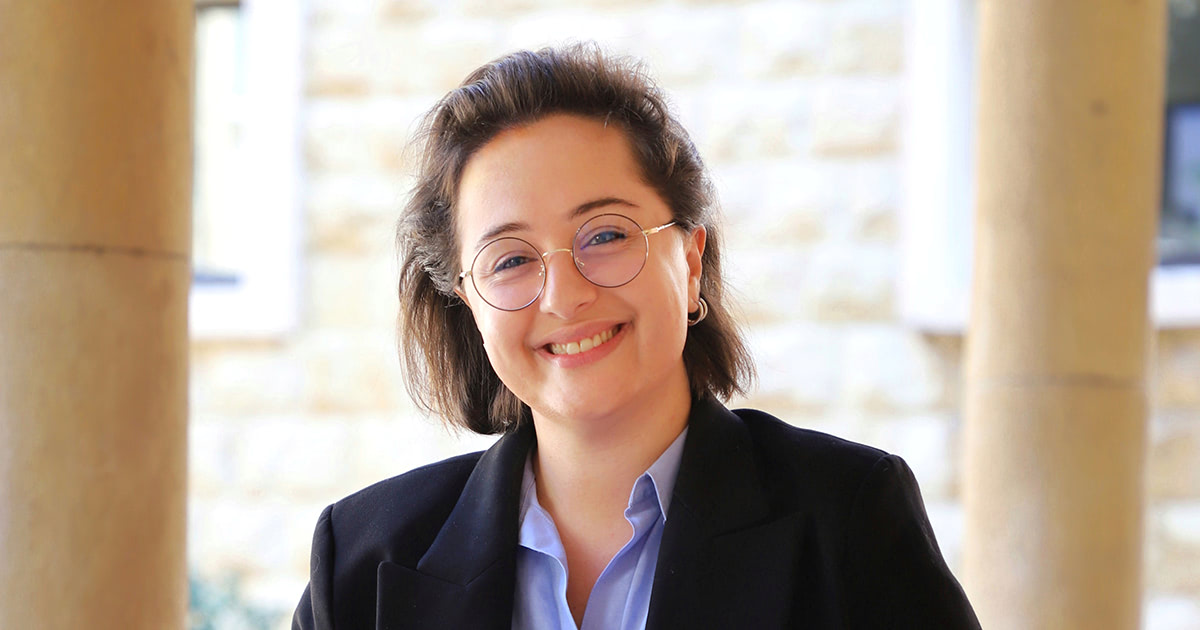Dr. Jasmin Lilian Diab Receives Prestigious Prize for Advancing Refugee Studies
The Director of the School of Arts and Sciences’ Institute for Migration Studies earns recognition for her innovative and ethical approach to studying displacement and its impact on marginalized communities.
Forced migration and displacement remain among the most urgent global challenges, intersecting with critical issues of human rights, identity, and resilience. As millions are uprooted by conflict, climate change and political instability, refugee studies play a crucial role in shaping more just and inclusive policies.
In response to gaps in documentation and dominant migration narratives, Dr. Jasmin Lilian Diab, director of the Institute for Migration Studies (IMS) and assistant professor at LAU’s School of Arts and Sciences (SoAS), has dedicated her career to amplifying the voices of marginalized communities and advancing innovative, participatory research methodologies in the field.
Recently, Dr. Diab’s contributions earned her the prestigious Lisa Gilad Prize, awarded by the International Association for the Study of Forced Migration (IASFM) at the 2025 biennial IASFM international conference to celebrate scholars whose peer-reviewed research made a “particularly meritorious contribution to refugee studies.”
This award came in recognition of her article, “Missiles and Misfits: Reimagining Home and Security for Queer Internally Displaced Persons From South Lebanon,” which examines the lived experiences of queer individuals displaced within Lebanon due to the recent Israel-Hezbollah conflict.
In this interview, Dr. Diab shares insights into her research and her vision for a more inclusive and participatory future for refugee studies.
What challenges do you face while researching and writing about such sensitive and underrepresented topics?
Researching sensitive and underrepresented topics often means navigating a fine line between amplifying marginalized voices and ensuring their safety and dignity. A significant challenge lies in accessing communities that have faced systemic oppression, such as queer Syrian refugees or female-headed households, and building trust in environments where fear and precarity are everyday realities.
Ethical considerations are paramount—ensuring informed consent, safeguarding participants’ anonymity, and mitigating the risk of re-traumatization. Furthermore, these topics often lack comprehensive documentation, requiring me to rely heavily on participatory approaches that center on the lived experiences of those directly affected.
Finally, working in Lebanon—a country facing its own intersecting crises—presents logistical, political and funding hurdles that complicate research implementation.
You emphasize the use of trauma-informed and participatory research methods in your work. How do these approaches shape the way displacement is studied and understood?
Trauma-informed and participatory methods prioritize the agency and dignity of participants, shifting the research dynamic from extractive to collaborative. These approaches allow displaced individuals to define their narratives and highlight their resilience and complexities rather than reducing them to victims or statistics.
For example, my recent work with queer Syrian refugees in Lebanon foregrounds their nuanced experiences of systemic discrimination and their aspirations for a safer future. This method not only enriches the understanding of displacement but also challenges dominant narratives by centering the voices of those who are often silenced.
Moreover, it ensures that the knowledge produced is not just about marginalized communities but is also created with and for them, fostering a more inclusive and equitable understanding of displacement.
You mentioned that this award is an acknowledgment of the support you’ve received at LAU. Could you elaborate on how the institution and its environment have influenced your work and research?
LAU has been instrumental in providing an academic environment that values interdisciplinary and critical research. As the director of IMS, I’ve had the privilege of collaborating with colleagues who share a commitment to advancing scholarship that directly addresses human rights and social justice.
The institution’s emphasis on community engagement and its support for participatory and trauma-informed research methodologies have profoundly influenced my approach.
What do you see as the next steps in your research agenda? Are there specific projects or areas you are looking forward to exploring in the near future?
Some of my upcoming projects are deeply shaped by the evolving displacement and migration landscape in the region, particularly in the aftermath of the 2024 Israel-Hezbollah conflict and the fall of the Assad regime. I’m currently exploring the lived experiences and migration aspirations of queer Syrian refugees, highlighting the systemic barriers to safety they faced even before the conflict and challenging assumptions about the desire of the displaced to return to Syria.
I am also investigating the prolonged displacement of female-headed Syrian refugee households, analyzing how gendered inequities, caregiving responsibilities, and economic precarity shape their migration decisions and aspirations, particularly in relation to their children’s futures.
To browse more scholarly output by the LAU community, visit our open-access digital archive, the Lebanese American University Repository (LAUR).
